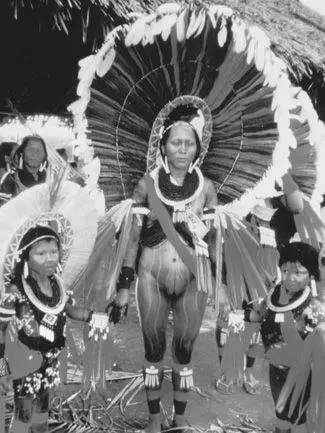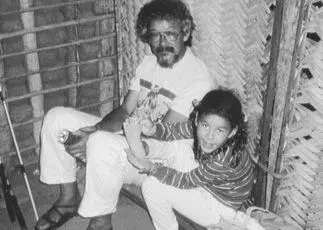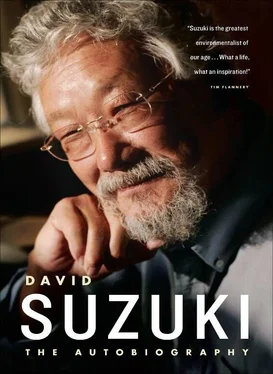For dinner, we got a fire going and Paiakan cut up a big tucunare we had caught and put the pieces onto a large leaf. He squeezed a lemon over them, put on some salt, then wrapped the leaf around the fish and tossed it into the fire. Half an hour later, he opened the leaf to reveal a steaming meal that was absolutely delectable. I told Paiakan that where we came from, people would work for years to save enough money to take a trip to spend two weeks doing what he and his people do every day. He seemed amused, if not confused.
On our way back, as I had suspected it might, fuel became a real concern. Here at the equator we were soon enveloped in the black of night with a couple of flashlights whose batteries could go flat at any time. As we putt-putted against the current, those flashlights reflected off eyes in the shallows — crocodiles! Everywhere. Fortunately, this particular species is quite timid with people. Miles has a great dislike of snakes, and we'd heard of the giant anacondas lurking in the rivers. Whenever we had to get out of the canoe in shallow, rocky stretches to push the boat along, I felt bad for Miles, but he never complained.
We alternated between pushing and putt-putting along until we finally ran out of fuel and had to paddle. Paiakan kept unnerving us by gazing intently ahead and saying in Portuguese, “What happened to the village?” There were no bright lights or search parties to greet us when we finally turned a bend and recognized our swimming hole. It had been a wonderful adventure, but I sure was glad to be back in our hut, which had become home.
On one trip, we traveled far down the river to a place where sand-bars arose in the water. We beached the canoe and Paiakan showed us how to recognize places where turtles had laid their eggs. For my girls it was like an Easter egg hunt, and they scrambled along the sand looking for the telltale signs and digging deep down to find the buried treasure. “Don't take them all,” we were told. “Always leave some to hatch.”
Suddenly, Paiakan looked up and saw that the girls had wandered far away. He tugged my arm, clearly alarmed, and told me to call the girls to come back right away: “Tem onça!” We were in jaguar country. It was the first time I saw him express fear. Without alarming the children, we called them back. We found the boiled eggs to be chalky and unappetizing, but of course it's a matter of personal taste and experience; the Kaiapo love turtle eggs.
On another river trip, Paiakan and one of the young men stood on the bow of the canoe as we paddled along and with great expertise they cast a circular net. The net had weights along the edge; when it was cast properly, centrifugal force on the lead sinkers splayed the net into a perfect circle that trapped fish beneath it as it sank. A rope tied to the center of the net caused the weights to move toward each other as the net was drawn up; fish were entangled in the mesh. I tried several times but failed miserably to duplicate the cast. All of the schooling I had spent so long to acquire was useless here.
One day, we asked to walk through the forest. Irekran's brother, Diego, and a friend of his were assigned to accompany us. As we followed a path, we were struck by the number of trees bearing fruit or nuts. Diego pointed out other edible plants everywhere. As we walked, the painted bodies of our guides blended into the pattern of shadows and light and rendered them virtually invisible to our unpracticed eyes.
We were enjoying ourselves, eating bananas and mangoes, swinging on vines over creeks, or slicing pieces of certain vines to drink the water that gushed out of the cut end. But we were incredibly vulnerable. Our guides would appear and vanish, and if they had taken off for any reason, there was absolutely no way we could have found our way back to the village. There were moments when I wondered if Tara and I had been foolish to put our children in such precarious situations. But we weren't abandoned, and soon we were back in familiar territory, walking through the small clearings where plants were cultivated and farinha was roasted.
Before we had decided in which month to go to Aucre, we had asked Darrell Posey when there might be a festival or celebration. “Oh, go on down anytime,” he advised. “They have celebrations all the time.” Sure enough, we had been there for about six days when the women appeared with their bodies painted very dark and wearing only a sash of the kind they carry their babies with. For perhaps an hour, they danced around in rows on the grounds the huts were facing. We learned it was the start of a three-day celebration to honor women.
Next day, the women appeared in far more elaborate regalia, beads, and feather headdresses, and sang and danced for a longer period. On the third day, their adornments were spectacular, with feathers woven into wooden frames that towered over the women's heads. Elaborately painted, the women began to dance just before sundown and continued into the pitch-dark night. Then we were told in not-so-subtle gestures that it was time for us to bugger off, which we did. We felt privileged to have witnessed this amazing ritual.
After we had been in Aucre for about a week, Sarika asked Tara to take a sliver out of the bottom of her foot. Tara looked at it and called me over; a small volcano was erupting from Sarika's skin. Tara disinfected a needle and the area around the “sliver” and began to pick an opening to remove the object. She got it out and put some more disinfectant and a bandage on as Sarika went off happily. Tara held up what she had pried out — a small, fat worm. It was a parasite that apparently infects mammals during a certain time of the year. It sheds its eggs in the ground, and as animals pass by, the parasite attaches to the skin and burrows in. I later heard of a German cameraman who had picked over seventy of them from his legs.

Oe and Tania with their aunt before a festa in Aucre

Sarika showing where the parasitic worm was in her foot
Earlier, I had stubbed my toe on a sharp stick projecting out of a wall. One of our biggest worries was getting an infection in a cut, so I sloshed on disinfectant and bound my toe tightly with tape. That night, the toe began to hurt, and by the second night, it was throbbing each time my heart beat. “Dammit,” I thought, “it must be infected.” Next morning, I tore off the bandage. The throbbing stopped; I had bandaged it too tightly. When I looked at the cut, it was healing well. But beside the cut under my toenail were three worms. Tara dug them out for me and I stopped wearing sandals.
Two days after we had arrived in Aucre, a woman had fallen from a roof and gashed herself very badly on a machete. We learned then that there was a radio phone in the village for emergencies, and frantic calls were made to send the plane in to take her out. After a day, the plane arrived and she was taken to Redenção, where she developed an infection and died. In a community of two hundred, an accident of this severity was upsetting to everyone.
About five days after our arrival, I woke early to wailing all around us. I woke Tara and suggested something bad had happened; perhaps someone had died. We got up and watched people streaming toward one of the huts, where a woman was screaming and trying to flagellate herself with pots and machetes — anything within reach. Other women restrained her and wailed with her. It turned out that an old man had died unexpectedly of tuberculosis. Next day we tried to be as inconspicuous as possible as the body was taken into the forest, where, we gathered, in the customary way it was left on a platform to be consumed by wildlife. I don't know the details of how his wife was dealt with, but somehow she was calmed, and the grounds were “cleansed” by a single male who walked back and forth for hours with a broom, sweeping away the spirits.
Читать дальше




![David Jagusson - Devot & Anal [Hardcore BDSM]](/books/485905/david-jagusson-devot-anal-hardcore-bdsm-thumb.webp)









